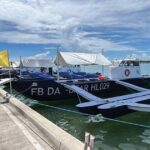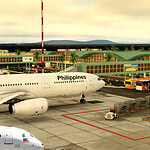DAVAO CITY (MindaNews / 18 November) – A marine biologist on Friday called on Environment Secretary Maria Antonia Yulo Loyzaga to act on the destruction wrought by the construction of the Chinese-funded Davao-Samal bridge to a robust coral reef system called Paradise Reef.


Located in Samal Island, Paradise Reef is a compact coral reef measuring an estimated 1.5 hectares – or at least a third of the Davao City People’s Park – and hosting numerous species of marine life. It is visible during low tide from the popular Paradise Beach Resort.
Colonies of hard corals, about the size of 10 public school classrooms, are now dead, Dr. John Michael Lacson, who holds a doctorate degree in marine biology from the University of Texas, said.
He blamed the construction of the P23-billion Chinese-funded Samal Island – Davao City Connector (SIDC) project for the underwater devastation.
Lacson offered to guide and show the dead corals to various government agencies, especially the Department of Environment and Natural Resources and its attached agencies.
“These colonies of hard corals adjacent to the craneway preconstructed for the SIDC are now dead because siltation covered them and they are now overgrown with lumot (algae),” Lacson said in a letter to the Paradise Beach Resort management furnished to MindaNews on Friday.
The dead corals are part of Samal Island’s healthy contiguous reef system called Paradise Reef, which Lacson has been observing in the last 15 years.
Last November 7 and 12, Lacson went underwater to check on the impact of the bridge construction on the corals, and estimated that about 600 square meters of corals in Paradise Reef – the size of about 10 classrooms – are now dead and reduced to rubble.
In his letter to the management of Paradise Beach Resort, dated November 12, Lacson said the dead corals were covered with silt, which clogged the coral polyps.
“As the coral became stressed, its living tissues died and turned into skeletal fragments (rubble) and the structure became overgrown with algae,” Lacson explained.
Coral polyps are tiny little animals and are related to anemones and jellyfish. They can live individually, or in large colonies that comprise a coral reef, according to global non-profit Coral Reef Alliance.
Lacson called the destruction of coral colonies in Paradise Reef as “ecological succession,” where a coral reef is succeeded by an algal reef.
The hard corals, habitat for fish crucial to the food production and economy of Samal Island, are being destroyed because the SIDC construction is not taking steps to protect the environment, he added.
Lacson noted that Paradise Reef ecosystem is “vital to the survival of coral reef communities fringing Samal Island.”
The Department of Public Works and Highways (DPWH) is undertaking the construction of the bridge. The construction contract was awarded to China Road and Bridge Corp. at the twilight of the Duterte administration.
MindaNews sought Engr. Joweto Tulaylay, SIDC project manager, for comments about the impact of the bridge project to the coral reef system but he has yet to respond as of Monday.
Last June, the Davao Sustainable Movement, a coalition of environmental and civil society groups here that opposes the current alignment of the bridge, estimated the damage to corals at 63 square meters, the size of a classroom, as the construction for the craneway then went full-blast.
The craneway will be used to bring in the materials needed to construct the bridge, which once completed will reduce travel time between this city and Samal Island to five minutes.
Currently, Roro vessels serve the route with a travel time of about 20 minutes. The car queue to board the vessels takes long, sometimes hours, especially during weekends or holidays.
The DPWH’s Environmental Impact Assessment (EIA) report released in July 2020 did not discuss the impact of the offshore construction on the coral reef system but only on the impact on the “seagrass, disruption of fish habitats, and disturbance of natural sedimentary habitats on Samal Island.”
The DPWH EIA report was “largely incomplete, misleading, deceptive and highly inaccurate,’’ said marine biologist Filipina Sotto, head of the FBS Environment and Community Research and Development Services team that conducted a study in 2019 commissioned by the Rodriguez-Lucas family.
The Rodriguez-Lucas family owns Paradise Beach Resort and Costa Marina Beach Resort. The bridge is sandwiched between the two resorts.
Sotto and her team had recommended against building the landing site near Paradise Reef as “it will definitely cause irreparable, irreversible and incalculable damage to the best marine ecosystem in Samal Island that will have adverse ecological impact to the Davao Gulf as a key marine biodiversity area.” (Bong S. Sarmiento / MindaNews)



